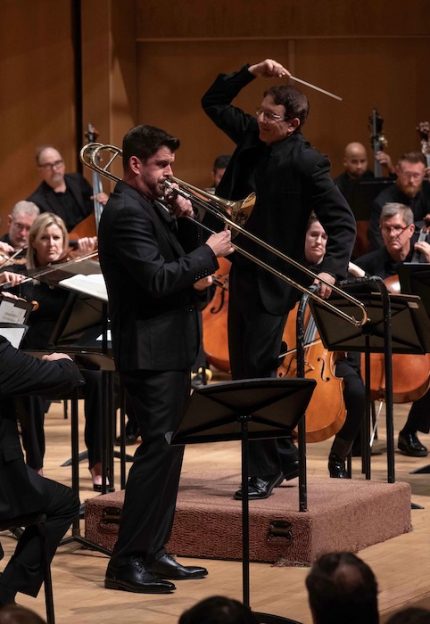Chicago Philharmonic marks 30th anniversary with ode to “Life”

In a city that prides itself on hard work and celebrates self-starters, few cultural institutions capture that kind of can-do spirit like the Chicago Philharmonic. An ensemble of world-class musicians whose leadership is largely retained by the artists, the cultural value of such ensembles is affirmed by the longevity of the Chicago Philharmonic. The orchestra marked the 30th season of their founding with a concert Sunday afternoon at Northwestern University’s Pick-Staiger Concert Hall.
Led by artistic director and principal conductor Scott Speck, Sunday’s program – titled “Life” – was the first in a season-long exploration on aspects of Family, a fitting theme as the orchestra enters a third decade in its current self-governing iteration.
To commemorate this milestone, the Chicago Philharmonic launched its inaugural Fanfare Competition for young composers earlier this year. Each of the competition’s two winners will have their submissions performed by the orchestra in concerts during the 2019/20 season.
The first of these, Young Voices from 19-year-old Illinois State student Harrison Collins, was heard in its world premiere. The fanfare, which Collins describes as “a portrait of youthful determination and celebration of the youngest generation of American adults,” opens with a repeated three-note motif in the solo horn that is then taken up by the rest of the orchestra, serving as a backdrop against which broad melodies and syncopated grooves unfold.
Harrison’s respectable contribution shared the top of the program with Anna Clyne’s Masquerade. Clyne’s piece is an homage to the street fairs of the composer’s native London, depicting the festivities in alternating vignettes of swirling, technicolor flourishes interspersed with English folk melody.
The orchestra delivered a clean and accurate performance of the work. However, one was left wanting more verve, as Masquerade fell flat on account of Speck’s decidedly safe tempo that dulled the piece’s inherent whimsy.
Rounding out the program’s first half was Ferdinand David’s Trombone Concertino, with the orchestra’s first-rate principal Jeremy Moeller in the solo role. Lending his bronzed tone to the entire range of his instrument, Moeller navigated the piece’s technical demands with finesse. He excelled in sensitive dynamic shading throughout, as in the singing upper-register lines of the Allegro maestoso. The orchestra delivered sturdy support to their colleague; in especially fine form were the Philharmonic’s woodwinds, whose lovely delivery of Concertino’s opening chorale was just one of many notable moments from the section throughout the afternoon.
“For a concert called ‘Life,’ we couldn’t end with anything other than Tchaikovsky Pathétique,” said Speck in his introductory remarks to the Sixth Symphony. Though indeed the final work premiered during the composer’s lifetime, recent champions of the Sixth have strained against the overwrought fatalistic tropes of earlier interpretations.
Speck also managed to steer clear of too much schmaltz in this performance, favoring a leaner reading that underscores the more optimistic aspects of Tchaikovsky’s final symphony.
The opening Adagio began somewhat heavily, though quickly gained momentum with the ensuing allegro. The first movement seemed an effective synopsis for the work as a whole, with Speck keenly navigating the ensemble through the movement’s contrasting moods of anxiety and nostalgia. Of note were the low brass, whose golden tones in full force were welcome after such restraint earlier in the program. In the movement’s quieter moments, Sergey Gutorov’s folksy clarinet solos offered spots of earnest tenderness amid the sturm und drang.
The orchestra found its footing tempo-wise in the lopsided five-four “waltz” of the second movement, in which elegant solos from flutist Thomas Robertello lent an air of refinement to the gently ambling melody.
The musicians of the Philharmonic delivered some of their finest playing of the afternoon in the barnstorming march: full-ensemble punctuations and sweeping runs alike crackled with energy, yet under Speck’s careful baton, never felt frantic. At the third movement’s rousing conclusion, Speck enthusiastically encouraged the audience’s knee-jerk applause where others conductors would make efforts to silence it.
The orchestra proved their mettle in the passionate finale, which has become somewhat of an interpretive litmus test for the Sixth. Though the pace of the lush adagio theme erred on the conservative side, the strings still delivered the melody with shimmering intensity; never in this program was their sound richer.
Throughout the movement, the pacing was even and measured, making Speck’s Pathétique feel more like a quiet rumination on life than a slow march to the grave. Even as the recurring “heartbeat” motif in the basses and finally faded into the ether, the feeling evoked was not one of sorrow, but of acceptance.
Credit is also due to the audience, who managed to suspend the delicate silence for nearly a half-minute before bursting into a hearty applause.
Former music director Larry Rachleff returns to conduct the Chciago Philharmonic in an all-Beethoven concert November 17. The program includes the Symphomy No. 3 “Eroica” and Violin Concerto with David Perry as soloist. Concert time is 3 p.m. at the North Shore Center for the Performing Arts in Skokie. chicagophilharminc.org
Posted in Performances




